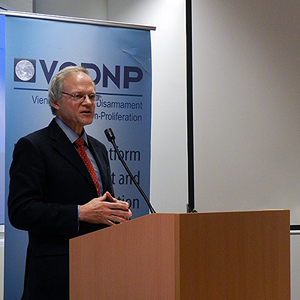

On 9 March 2015, VCDNP hosted a seminar by Mark Fitzpatrick, director of the Non-Proliferation and Disarmament Programme at the International Institute for Strategic Studies in London, who offered reflections on the security situation in South Asia as it relates to the presence of nuclear weapons in the region. He began by reiterating an oft-made assessment that if there is a nuclear exchange in the foreseeable future anywhere in the world, it will most likely take place in South Asia. The probability of such an exchange is low, he clarified, but occasional flair-ups along the Indian-Pakistani border, state-sponsored terrorism (whether real or perceived), or a breakdown in communications during a crisis could nonetheless provoke a nuclear exchange. The best way, argued Fitzpatrick, to prevent a dangerous escalation is through dialogue in order to establish mutual understanding and appropriate mechanisms to avoid such an event.
The two states, Fitzpatrick noted, are prone to conflict along their shared border; the greatest source of contention, Kashmir, remains unresolved; and cross-border terrorism remains ever possible. Despite all of this, he said there are many in South Asia who would argue that, as prominent scholar Kenneth Waltz famously claimed, nuclear weapons have prevented these conflicts from escalating into war. Fitzpatrick said that while this may be true—given that both sides are aware that escalation could also prompt a nuclear response—nuclear deterrence and stability in South Asia may not be perpetually reliable.
In particular, he pointed out that such staunch belief in nuclear deterrence could generate a false sense of security, which in turn could embolden the parties rather than moderate their behavior. He also noted the possibility that misperception could lead one side or both to make good on its deterrence threat: for example, defensive measures can be misinterpreted as a prelude to aggression, acts of terrorism can be taken for state-sponsored actions, or a nuclear accident mistaken for a deliberate attack.
Misinterpretations of declared nuclear doctrines further contribute to instability in the region. For example, Pakistan does not trust India's declared no-first-use policy, pointing out that this policy allows for a nuclear response to a biological or a chemical attack. Pakistan's declaration that it may use nuclear weapons in response to an attack with conventional forces also leaves a significant degree of ambiguity. It is unclear which scale of aggression would warrant a nuclear response, how many weapons will be needed, and so on. Moreover, a military conflict can generate the "use it or lose it" mentality that favors early large-scale use of nuclear weapons.
The path toward reducing the risk of a confrontation—including a nuclear one—in South Asia is dialogue, Fitzpatrick argued. He noted efforts to increase communication between the parties, but characterized them as too limited, sporadic, and prone to break up. An example of that pattern is the 1999 Lahore Summit, which started a process that was cut short by the 2001 attack on the Indian parliament by Pakistan-based terror groups Lashkar-e-Taiba and Jaish-e-Mohammed. He also pointed to the absence of talks on nuclear risk reduction since 2007. Fitzpatrick said that it is important for India and Pakistan to have these talks during peacetime so that, if communications fail in the "fog of war," parties do not end up in an unintended escalatory dynamic that could result in either or both sides utilizing their nuclear arsenal.